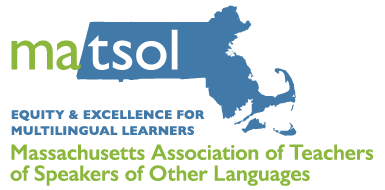Temporary, part-time contract position. Must be able to work on-site in Framingham, MA on May 28-30, 2025 from 7:30AM – 4:00 PM (EDT)
MATSOL is looking for an upbeat professional to support presenters on our digital conference platform during the 2025 MATSOL Virtual Conference, which brings together educators of Multilingual Learners of English from across the Commonwealth of Massachusetts to share expertise and best practices. This is a great opportunity for someone who wants to learn more about TESOL and ML education!
Overview:
Serve as Zoom host for virtual live streamed sessions at the in-person MATSOL Conference.
- Use Zoom Meeting Pro integrated within the Whova conference platform (app and web) to livestream the in-person conference.
- MATSOL will provide a laptop computer and Zoom account for hosts to use during the conference.
- The livestream team will also include a videographer to film the livestream, and a MATSOL volunteer to assist in the presentation room.
Responsibilities:
- Host and manage attendees in large Zoom meetings (up to 500 virtual attendees) and ensure presentations and livestream go smoothly.
- Act as the primary support person for presenters assigned to you during the conference week.
- Set up Zoom Meeting and the Whova features before sessions start.
- Do a tech check with presenters 15 minutes before each session.
- Start and stop recording the session.
- Monitor chat and Q&A and relay questions to the presenter. Assist presenters as needed by sharing links, launching polls, etc.
- Create breakout rooms (if applicable).
- Remain professional and upbeat throughout the presentation.
- Troubleshoot any problems during a presentation.
- Work with the volunteer assistant and A/V team to help make it the best experience for both the in-person and virtual audience.
- Remain in communication with the MATSOL team throughout the conference.
Requirements:
- Ability to work on-site from 7:30am to 4:00pm in Framingham, MA for all three days of the in-person conference (May 28-30, 2025).
- Experience facilitating large group meetings and presentations with the ZOOM Pro meeting platform, including using breakout rooms, chat, Q&A, polls, YouTube live feed, etc.
- Experience with a virtual conference platform like Whova.
- Personal device (laptop, smartphone, tablet) with WiFi capability, and can run/download the Whova web/app.
- Proficient with computers and technology and able to learn new systems quickly.
- Proficient with Google Slides and PowerPoint.
- Professional, upbeat demeanor with good communication and problem-solving skills.
Time commitment:
- Week of April 28, 2025: Independently review and complete training materials and participate in two live online training sessions (M/W 10-11AM)
- Week of May 5, 2025: Attend the online livestream presenter orientation to introduce yourselves, answer some questions.
- Wednesday-Friday, May 28-30, 2025: Host up to five conference sessions per day between 7:30am to 4pm, with scheduled breaks.
Location: Sheraton Framingham Hotel & Conference Center, Framingham MA
Stipend: $700.00 for training and 3 days hosting.
Lunch is provided. Free parking at the hotel.
Interested? Send your resume to apply@matsol.org
“2025 livestream host” should be in your email subject line.









